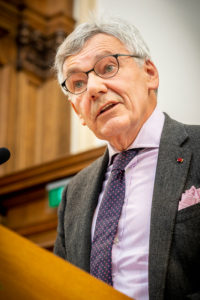The condemnation of the Rwandan Belgian Paul Rusesabagina by the Rwandan justice and the critical reaction of our foreign minister Sophie Wilmès provoked a diplomatic conflict between Brussels and Kigali . The meeting scheduled for New York was quickly canceled by Rwandan colleague Biruta.
Wilmès’s intention was, however, perfectly legitimate and justified. It is appropriate for two countries which have good relations to discuss at a high political level in the event that a difference of opinion threatens to jeopardize the serenity of relations. The reaction of our Deputy Prime Minister to the verdict is the logical extension of the concerns expressed by Belgian diplomacy since the controversial arrest – by kidnapping – of our compatriot Rusesabagina, and throughout the trial. The rights of the defense were not guaranteed. The convict did not have a fair trial.
The cancellation of the interview was announced by Kigali with a scathing reference to “contempt” (contempt ) that Belgium would tend to show towards his Rwandan partner.
Neither the Rwandan attitude nor the language used have their place in a normal relationship , and certainly not when the option of a calm interview was on the table, in order to clarify positions and avoid “cumulative crises”. . Even in diplomacy, frank and respectful discussions can be used as good therapy.
But President Kagame and his supporters do not seem very inclined to dialogue, once again. Perhaps they are not capable of it either. They flee the in-depth debate where each other’s words, arguments and counter-arguments, are patiently and calmly explained and weighed. Too often we have to be content with an attitude showing intellectual and moral weakness: disparaging and arrogant attitudes, slogans and propaganda, reproaches and accusations, lies or truncated stories. Fewer and fewer observers appreciate a lamentably reductive and bitter speech.
In fact, the verdict and the tribulations that go with it are also producing effects that we should not regret too much. Little by little some things become clearer.The indulgence, even the flattery, with which the achievements of the Kagame regime have been applauded, now give way to serious doubts, even critical judgment. Darker aspects of the same “model” become more difficult to smother or make-up. Although Kagame’s masks have fallen off and admirers’ blinders have been gone for some time now, many are now saying enough is enough. Kagame must be called to order and held to account, both for his past and for his current practices, which violate human rights. The international community’s guilt complex for its negligent behavior during the genocide, which Kagame skillfully exploited, is approaching its expiration date.
It must not be pleasant for certain Belgian political leaders, who believed and acted with cautious, even complacent reflexes, in the face of the worrying situation in Rwanda, to have to endure the insulting behavior of a leader of a friendly country and to reap only contempt. Such frustrations are also likely to manifest themselves in certain sectors of our civil society, in some media and NGOs, and even in certain academic circles. President Macron may have negotiated smart deals in Kigali in exchange for a submissive attitude towards the Rwandan dictator, but that doesn’t explain the fact that much of the French intelligentsia bow to the dictates of propaganda. Rwandan. Rusesabagina’s trial spoof will hopefully cause
Hasn’t the time come to break free from politically correct representations, from the unique and polarizing thought concerning the Rwandan genocide , and to oppose the perverse effects of such an approach? Isn’t it time that Rwandans and non-Rwandans alike could say what’s on their minds, ask legitimate questions or simply oppose peddled narratives and reprehensible policies without being systematically put to the ban deniers and divisionists?
Rwanda and Africa are too important to be the victims of a polluted debate where there is no room for nuance, questioning, listening, respect.
I will never feel prevented from continuing to denounce the negative forces that provoked and perpetrated the genocide, and to underline the positive aspects of the reconstruction of the country, but I will also continue to oppose the selective indignations which relativize or trivialize the violations. rights, arguing that Rwanda suffered much worse calamities 30 years ago and is now experiencing spectacular growth rates. In all fairness, we have to ask ourselves whether the genocide has revealed all its secrets and whether Rwandan statistics have been spared any cosmetic embellishment.
Rwanda is too important, certainly for Belgium, to give rise to a sickly convulsive relationship. Neither arrogance nor indulgence has a place in this relationship . Belgians and Rwandans must understand that a mature dialogue, in a spirit of mutual respect, offers the best opportunities. Investing in respect leads to a relationship of trust, in which the positive and less positive aspects can and should be mentioned, with tact, nuance and willingness to listen, even if a certain assertiveness is required on occasion. Above all, let us be careful not to fall into the trap where contempt and disdain can thrive.
Johan a swinnen
Former Ambassador to Rwanda (1990–94)
Author of “Rwanda, mijn verhaal” (Polis, 2016)





























































